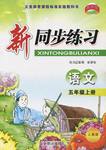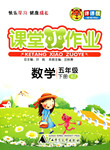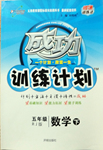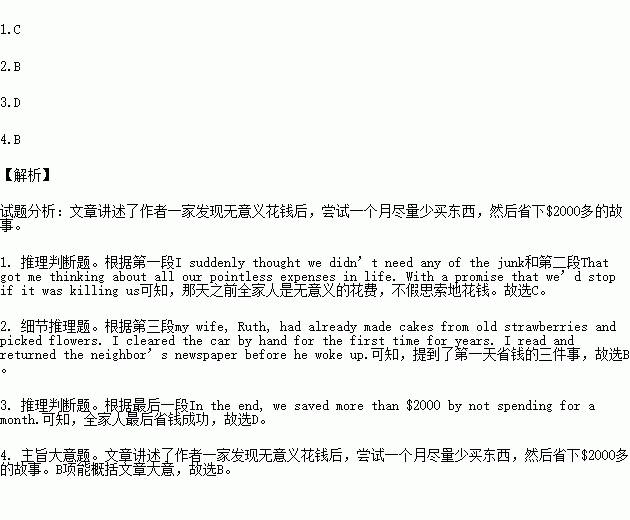题目内容
One afternoon, after finishing shopping in a supermarket, my family and I went to the checkout. I suddenly thought we didn’t need any of the junk, and we abandoned all of those, saving $300.
That got me thinking about all our pointless expenses in life. With a promise that we’d stop if it was killing us, I convinced the family to take the leap into frugality(节俭). The rules were that we would buy nothing for 30 days except absolutely essentials.
Our adventure began with a great start. By 9 a.m., my wife, Ruth, had already made cakes from old strawberries and picked flowers I didn’t even know we had in the garden. I cleared the car by hand for the first time for years. I read and returned the neighbor’s newspaper before he woke up. Total spending on the first day: $0.
As days turned into weeks, we became so proficient(熟练的) at living frugally. We started riding our bikes to save gas. My child’s finger painting was recycled as gift wrap for the homemade presents. We started to use an Internet application like Skype for free phone calls and ask neighbors with gardens for extra vegetables and herbs.
In the end, we saved more than $2000 by not spending for a month. When we began, I imagined we would rush out the moment we were done and buy a lot of things in the supermarket, then maybe hit the mall or go to the movies.
1.We can infer from the passage that before that very afternoon, the family _________.
A. had had higher income
B. had had a good habit of saving money
C. had often spent money without thinking much
D. hadn’t realized they would have met financial problems
2.How many things were mentioned about the things the family did to save on the first day of the “30 days”?
A. Two.B. Three.C. Four.D. Five.
3.The end of the story tells the readers that the family _________.
A. stopped halfway
B. couldn’t stand the life of frugality
C. would make up for missing the junk after the “30 days”
D. succeeded in saving in the end
4.This passage is mainly about _________.
A. how a family managed their daily life
B. a family’s no-buying try
C. a family’s way of solving life problems
D. how a new idea came up
 教学练新同步练习系列答案
教学练新同步练习系列答案 课前课后同步练习系列答案
课前课后同步练习系列答案 课堂小作业系列答案
课堂小作业系列答案 黄冈小状元口算速算练习册系列答案
黄冈小状元口算速算练习册系列答案 成功训练计划系列答案
成功训练计划系列答案 倍速训练法直通中考考点系列答案
倍速训练法直通中考考点系列答案阅读使人明智,阅读使人充实。阅读的好处很多,但是,目前许多中学生都不重视阅读。请你根据下表内容写一篇100字的英语短文,对这一现状进行分析并提出建议。文中不能出现真实的人名,校名和地名。开头已给出,不计入总词数。
内容要点如下:
不重视阅读的原因 | 如:1. 作业太多 2. 时间花在...... |
阅读的好处 | 如:1. 开阔眼界,获得知识 2. 学会如何思考 3. 生活更加丰富多彩 |
你的建议 | 如:养成良好的读书习惯...... |
At present only a few students do some reading after class. Here are several reasons. ____________________________________________________________________________________________
____________________________________________________________________________________________
____________________________________________________________________________________________
____________________________________________________________________________________________
____________________________________________________________________________________________
________________________________________________________________________

